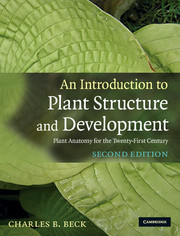Book contents
- Frontmatter
- Contents
- Preface to the second edition
- Preface
- Acknowledgements
- General references
- Chapter 1 Problems of adaptation to a terrestrial environment
- Chapter 2 An overview of plant structure and development
- Chapter 3 The protoplast of the eukaryotic cell
- Chapter 4 Structure and development of the cell wall
- Chapter 5 Meristems of the shoot and their role in plant growth and development
- Chapter 6 Morphology and development of the primary vascular system of the stem
- Chapter 7 Sympodial systems and patterns of nodal anatomy
- Chapter 8 The epidermis
- Chapter 9 The origin of secondary tissue systems and the effect of their formation on the primary body in seed plants
- Chapter 10 The vascular cambium: structure and function
- Chapter 11 Secondary xylem
- Chapter 12 The phloem
- Chapter 13 Periderm, rhytidome, and the nature of bark
- Chapter 14 Unusual features of structure and development in stems and roots
- Chapter 15 Secretion in plants
- Chapter 16 The root
- Chapter 17 The leaf
- Chapter 18 Reproduction and the origin of the sporophyte
- Glossary
- Index
- References
Chapter 6 - Morphology and development of the primary vascular system of the stem
Published online by Cambridge University Press: 05 June 2012
- Frontmatter
- Contents
- Preface to the second edition
- Preface
- Acknowledgements
- General references
- Chapter 1 Problems of adaptation to a terrestrial environment
- Chapter 2 An overview of plant structure and development
- Chapter 3 The protoplast of the eukaryotic cell
- Chapter 4 Structure and development of the cell wall
- Chapter 5 Meristems of the shoot and their role in plant growth and development
- Chapter 6 Morphology and development of the primary vascular system of the stem
- Chapter 7 Sympodial systems and patterns of nodal anatomy
- Chapter 8 The epidermis
- Chapter 9 The origin of secondary tissue systems and the effect of their formation on the primary body in seed plants
- Chapter 10 The vascular cambium: structure and function
- Chapter 11 Secondary xylem
- Chapter 12 The phloem
- Chapter 13 Periderm, rhytidome, and the nature of bark
- Chapter 14 Unusual features of structure and development in stems and roots
- Chapter 15 Secretion in plants
- Chapter 16 The root
- Chapter 17 The leaf
- Chapter 18 Reproduction and the origin of the sporophyte
- Glossary
- Index
- References
Summary
Perspective
The primary vascular system extends throughout the root system, the stem and its lateral branches, and appendages of the stem such as leaves, flowers, and fruits. The basic pattern of the primary vascular system is established initially by the arrangement of provascular tissue in the embryo. As development of the young plant proceeds, the provascular tissue becomes restricted to the shoot apex and to the root tip proximal to the root cap. Differentiation in the provascular tissue leads to the development of mature, functional primary xylem and primary phloem (Fig. 6.1). In primitive plants with central columns of primary vascular tissue (protosteles) (many pteridophytes as well as the roots of most plants), phloem surrounds the xylem (Fig. 6.1a). In those with tubular vascular systems (siphonosteles) this is usually also true, but in some taxa phloem may bound the xylem on the interior as well as on the exterior (Fig. 6.1b). In seed plants in which the primary vascular systems consist of discrete, or relatively discrete, vascular bundles (eusteles) (Fig. 6.1c, d), the spatial relationship of primary xylem and primary phloem varies according to the bundle type, i.e., whether collateral, bicollateral, amphicribral, or amphivasal. In collateral bundles, the primary xylem comprises the part of the bundle toward the inside of the stem and the primary phloem comprises the outer part (Figs 6.1, 6.2, 6.4) whereas in bicollateral bundles phloem occurs both to the inside and to the outside of the primary xylem.
- Type
- Chapter
- Information
- An Introduction to Plant Structure and DevelopmentPlant Anatomy for the Twenty-First Century, pp. 108 - 122Publisher: Cambridge University PressPrint publication year: 2010



